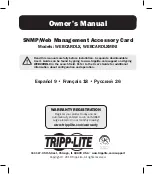
27604_8820-00778_F9K1103_N750_Dual-Band_Wireless_N_Router_041811_ok
2)
Click
“Wireless”
in
the
left
‐
hand
menu.
Then
click
“Security”
just
below
that.
3)
Select
the
“WPA/WPA2”
option.
4)
Enter
a
password.
This
can
be
from
8–63
characters
of
your
choice,
including
spaces
and
punctuation,
OR
a
64
‐
digit
hexadecimal
number
(using
only
the
numbers
0–9
and
letters
A–F).
5)
Click
“Apply
Changes”
to
finish.
Your
wireless
connection
is
now
encrypted.
Each
computer
using
your
wireless
network
will
need
to
use
the
new
key.
Note:
If
you
are
configuring
the
Router
over
a
wireless
connection,
you
will
have
to
re
‐
connect
to
the
Router
after
changing
any
security
settings.
Note:
Some
older
networking
hardware
supports
only
WEP
encryption.
If
your
older
computers
cannot
connect
to
your
network,
try
128
‐
bit
or
64
‐
bit
WEP,
or
seek
software
updates
from
their
manufacturers.
I
am
having
difficulty
setting
up
Wired
Equivalent
Privacy
(WEP)
security
on
my
Router.
1)
Log
in
to
your
Router.
Visit
http://router/
with
your
web
browser.
Click on the “Login” button in the top right-hand
corner of the screen. You will be asked to enter your
password. If you have never set a password, leave the
“Password” field blank and click “Submit”.
2)
Click
“Wireless”
in
the
left
‐
hand
menu.
Then
click
“Security”
just
below
that.
3)
Select
the
“128
‐
bit
WEP”
option.
4)
You
may
type
in
a
WEP
key
manually,
or
generate
one
from
a
passphrase.
Type
a
phrase
in
the
“Passphrase”
field
and
click
the
“Generate”
button.
A
WEP
key
is
composed
of
26
hexadecimal
digits
(0–9,
A–F).
For
example,
C3
03
0F
AF
4B
B2
C3
D4
4B
C3
D4
EE
74
is
a
valid
128
‐
bit
WEP
key.










































